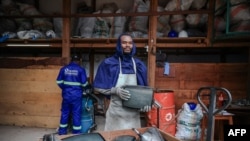Alioum is a 46 Cameroonian and he wears no masks or gloves as he bashes away at an old voltage regulator.
Alioum is not the only one who works under hazardous conditions, another three younger men are attacking other old devices with screwdrivers and knives.
Head of a Campaign group called World Action Phyto Protection Didier Yimkoua says “Electronic waste contains harmful substances that can cause diseases such as cancer in humans when they are released into the environment.”
Director of the NGO Solidarite Technologique –founded in 2011 and became one of the first recycling groups to be approved under the law– says that unlicensed recyclers “take what’s useful and toss out the rest, including items that are toxic for the environment.”
A decade ago, Africa was counted as the world’s dumping ground for toxic rubbish what pushed Cameroon to pass a law requiring greener and safer standards for disposing of e-waste blazing a trail as concern mounted that Africa is producing the world’s dumping ground for toxic rubbish.
Augustin Kenne who is in charge of dismantling at Solidarite Technologique explains that after it was approved under the law, Solidarite Technologique goes now around collecting broken gadgets from companies and households “in order to prevent the waste from ending up in the trash.”
Employee at Solidarite Technologique Camille Ndomo says that collections are made by appointment now. Ndomo says so while loading his tricycle with a gas burner, an LCD screen and a landline telephone recovered from a home in the city’s eastern Ewonkan district.
After the items are reached in the Solidarite Technologique’s headquarters, they get washed and dismantled by a dozen staff members equipped with gloves and masks and repairable items are fixed and sold.
“Over the past three years, we have been collecting 140 tonnes of waste annually, on average. Of this, about 40 tonnes is revalued –meaning reused– or disposed of at the Yaounde site.” Director of Solidarite Technologique Amel Poughela said.
Poughela also says that Cameroon was the first African country to have passed legislation on e-waste management.
Poughela adds that despite this legal step, recycling rates in Senegal are low and no data are available to clarify the picture.
The NGO plans to build a site to crush and safely incinerate waste that cannot be recycled.
The NGO has obtained a one-hectare (2.57 acre) site in Douala, but it does not have the funding, according to Poughela.




